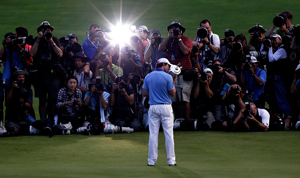Is This Golf's Brave New World?
Heading to the WGC-HSBC Champions for the last big showdown of the stroke play season, all of this season's Majors and World Golf Championships titles are in the hands of first-time winners at that level. That's never happened before. Tim Maitland investigates whether it means the sport has truly entered a new era

Something is happening in the golf world: 10 of the last 11 Major winners have been first-time winners. Six of the last seven WGC winners have also been new to winning at the highest stratosphere of the world game.
Since the WGC's were introduced in 1999 the titles have never all been simultaneously in the hands of newcomers to that echelon of winning. Since the end of World War II only three other years have ended with the Majors claimed by first-time winners: in 2003 (Mike Weir, Jim Furyk, Ben Curtis, Shaun Micheel), 1969 (George Archer, Orville Moody, Tony Jacklin, Raymond Floyd) and 1959 (Art Wall, Billy Casper, Gary Player, Bob Rosburg). Clearly, something is going on.
For all the fuss made of Tiger Wood's failure to qualify for Shanghai, it might be more significant that the tipping point for these statistics hasn't been his achievements.
It's not Tiger's last Major - the 2008 US Open - but Angel Cabrera's 2009 Masters that, statistically at least, seems to herald the end of one era and the start of another. It's not Tiger's last WGC - the 2009 Bridgestone Invitational - but Phil Mickelson's win a few months later at the HSBC Champions that heralds a shift towards a new type of winner.
Has golf entered a brave new world? Is it not just Tiger, but a generation of his rivals that are being ushered out? Is this just a brief lull in the Tiger era? The answer probably depends on your point of view.
Not Since The ‘50s
The only comparable time to this era - where only Phil Mickelson (2010 Masters) and Ernie Els (2010 WGC-CA Championship) have struck blows for the established names - is the period from 1957 to 1959. Back then, in a run of nine Majors, apart from Peter Thomson of Australia winning the fourth of his five Open Championships, the rest of the champions were newcomers to the upper echelon of tournament winning.
Subscribe to the Golf Monthly newsletter to stay up to date with all the latest tour news, equipment news, reviews, head-to-heads and buyer’s guides from our team of experienced experts.
In 50 year's time some of our recently crowned champions may have drifted into the relative obscurity of Lionel Herbert, the ethnic Cajun, who won the last match play PGA Championship in 1957, or "Terrible" Tommy Bolt, who may have added 14 other PGA Tour wins to his 1958 US Open title, but only remains a household name in the most golf-obsessed of families.
In 50 year's time, it's fair to assume, some of our recently crowned champions will be remembered in the same way we remember a couple of those first-time Major winners from back then. Like 1958 Masters winner Arnold Palmer or 1959 Open Champion Gary Player, it's quite possible that a Martin Kaymer, a Rory McIlory or maybe a Keegan Bradley will be legends too!
Perhaps those times were just as confusing for golf fans who were yet to fully comprehend that Sam Snead ('54 Masters) and Ben Hogan ('53 Open) had won their last Majors nor realised what the precocious then-amateur called Nicklaus was going to do to their game.
Europe's Golden Age
What is clear right now is that Europe, and the European Tour in particular, is dominant... or at least enjoying a period of unrivalled parity with the US. In the last two years three Northern Irishmen (Graeme McDowell, 2010 US Open; Rory McIlroy, 2011 US Open and Clarke) have claimed their first Majors along with Germany's Martin Kaymer (2010 PGA Championship). Tour members Louis Oosthuizen (2010 Open) and Charl Schwartzel (2011 Masters) have done likewise for South Africa.
England's Luke Donald, Kaymer (8 weeks) and Lee Westwood (22 weeks) have each held the number one spot in the Official World Golf Ranking since Woods relinquished top spot in Shanghai last November. Donald, fellow Englishman Ian Poulter (respectively, the 2011 and 2010 WGC-Accenture Match Play Championship winners) and HSBC Champions titleholder Francesco Molinari have all claimed their first WGC titles.
The facts are easier to relay than the reasons: although Westwood argues that the debate doesn't have to be complex.
"We're just very good at the moment. There's no other reason than that. You don't need another reason other than that. I just think European golf is really strong at the moment. We've got a lot of good players, so if you play well you're going to win. A lot of the players at the moment have been around a while, but also a lot of the good young players have just come through and are getting comfortable too," says Westwood.
"It's not something I really think about too much; I'm getting bored talking about it to be honest."
Not everyone finds the discussion so tedious. Alvaro Quiros, the flamboyant 28-year-old Spaniard, whose Dubai Desert Classic triumph in February guaranteed his place in the field for Shanghai, is far more excited about the situation.
"I think it's an amazing time, because at the same time we're playing great golf courses and great events with the best players of both of the main tours. Now is coming out the truth of the golf of both sides; obviously European golf is in a great moment and maybe the only time where European and American golf has been at the same level. We are in different stages, right now. It's like soccer in Spain. Barcelona is the best team in the world right now... by far, but five years ago it was Real Madrid by far too," Quiros points out.